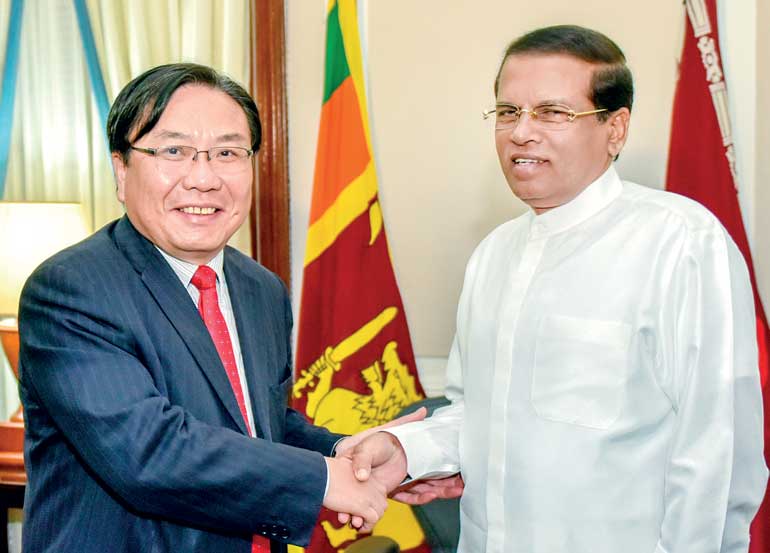Friday Feb 20, 2026
Friday Feb 20, 2026
Thursday, 30 November 2017 00:00 - - {{hitsCtrl.values.hits}}
 Asian Development Bank (ADB) Vice President Zhang Wencai with President Maithripala Sirisena during the former’s visit to Sri Lanka last week - File photo
Asian Development Bank (ADB) Vice President Zhang Wencai with President Maithripala Sirisena during the former’s visit to Sri Lanka last week - File photo
(Xinhua) Colombo: Sri Lanka has the potential to grow into a regional hub with more Foreign Direct Investments (FDIs) from other countries including China, Asian Development Bank (ADB) Vice President Zhang Wencai told Xinhua in a recent interview.
Zhang said Sri Lanka’s present economic growth was between 4.5% and 5%, but the island country had the potential to grow faster with more private sector investments.
Zhang said Sri Lanka had great potential but it needed to expand investments in various sectors including its manufacturing and service sectors, and to further improve its business climate.
“The country has big potential to be a regional trade and logistic hub with more external investments in sectors such as manufacturing,” said Zhang.
“The country should not just rely on tea, textile or tourism. Of course, these are very important sectors but the country should also try to develop more sectors and diversify the economy,” Zhang added.
Zhang further noted the large Chinese investments in the island country such as the development of ports, an economic zone in Hambantota, the construction of Port City in Colombo and highways would contribute to higher growth for the country.
He said such investments from other countries would also help Sri Lanka to develop higher value-added products and improve the quality of growth and people’s livelihoods.
Zhang called on the Sri Lankan Government to improve its business climate by providing a good legal and regulatory framework and simplified procedures for business registration in order to attract more private investments.
“Sri Lanka can further enhance the ease of doing business in the country if more efforts are made on measures such as a one-stop shop. With power, road, ports, telecommunication systems and facilities in place, and with more skilled labor available, Sri Lanka will certainly attract more investments,” Zhang explained.
He said that with Sri Lanka showing support for the Belt and Road Initiative and other regional initiatives such as South Asia Subregional Economic Cooperation, the ADB would explore how it could work with Sri Lanka to highlight the country’s position in the regional context.
“The Belt and Road Initiative was proposed by China and it has now become an international initiative. So many countries and international agencies are participating in the initiative. The ADB also signed an MoU with the Chinese government last May together with other multilateral development banks on how to work together to support the Belt and Road Initiative. In our member countries, we will see how the programs at the country and regional levels can align with the Belt and Road initiative,” Zhang said.
Zhang further said the ADB will see how ADB programs and Belt and Road Initiative can complement each other in Sri Lanka, including co-financing.
During Zhang’s visit to Sri Lanka last week, the Sri Lankan Government entered into two loan agreements with the ADB to borrow $ 150 million as the first tranche of an investment program to improve 3,400 km of rural roads and $ 200 million for a 100-megawatt wind power generation project.